5 Money Saving Heating & Cooling Tips for Homeowners
 Let’s face it, we can all use some help reducing our heating and cooling costs. We all want to save money on energy bills and get the most out of our HVAC systems. The more efficient our heating and cooling systems are, then less impact they have on our wallet and the environment.
Let’s face it, we can all use some help reducing our heating and cooling costs. We all want to save money on energy bills and get the most out of our HVAC systems. The more efficient our heating and cooling systems are, then less impact they have on our wallet and the environment.
Our HVAC company in Beaverton is here to help you keep your residential HVAC system running smoothly and help you save on utility costs.
Home Heating and Cooling Cost Savings
Are your utility costs higher than you’d like? Before you invest in a new HVAC system, there are a few tips to help increase energy efficiency and lower your bills. From routine maintenance to ENERGY STAR equipment upgrades, AAA Heating and Cooling has the best solutions to managing your residential energy costs.
5 HVAC Tips to Save Money on Your Energy Bills
1. Check and Change Your Air Filter Frequently
Dirty air filters can impede airflow and cause HVAC units to work harder to maintain your ideal indoor temperature. This added stress on your unit can result in wasted energy and higher utility bills.
To avoid clogged and dirty air filters, our HVAC installers recommend checking your air filters every other month. If you notice any dirt or debris, change the filter right away. Otherwise, plan to install a new air filter every three months. Sticking to this schedule will help prevent dust and dirt from accumulating in the system.
2. Install a Programmable Thermostat
 Investing in a programmable thermostat can help save you on energy costs. In the average household, nearly half of the yearly energy bill goes towards heating and cooling. Controlling your temperature settings allows you to save more while still maintaining a comfortable air climate.
Investing in a programmable thermostat can help save you on energy costs. In the average household, nearly half of the yearly energy bill goes towards heating and cooling. Controlling your temperature settings allows you to save more while still maintaining a comfortable air climate.
You can always shut off your unit while you are away, but this can cause other potential problems. For example, turning off your AC unit in the summer might increase humidity levels. Programmable thermostats allow you to set your ideal temperatures while at home and away, reducing energy waste.
3. Schedule Routine HVAC Maintenance
HVAC systems are complex machines that require routine tune-ups to keep them functioning at peak performance. Even if you’re not experiencing any problems with your residential HVAC unit, it’s a good idea to have your systems checked annually.
Your HVAC contractors will thoroughly check and tune-up all components of your unit including:
- Thermostat settings
- System controls
- Electrical connections
- Gas connections, pressure, burner combustion, and heat exchangers
- Air conditioning coils and refrigerant
Performing annual maintenance will help ensure maximum efficiency and improve the longevity of your unit.
4. Inspect and Seal Your Heating and Cooling Ducts
Ducts that transfer air to-and-from heat pumps, central air conditioners, and forced air furnaces can waste energy if not properly sealed. To help maintain energy efficiency, have your local HVAC installer seal the seams and connections of your duct system. Once your ducts are properly sealed, schedule professional duct cleaning every three to five years.
For even more energy-saving, consider investing in ductless heating and cooling. An alternative to forced air systems, ductless cooling and heating can save you on overall energy costs over time.
5. Choose ENERGY STAR rated HVAC Equipment
 If your HVAC system isn’t performing at its best, has low-efficiency ratings, or is more than 10 years old, it might be time to consider investing in a new system.
If your HVAC system isn’t performing at its best, has low-efficiency ratings, or is more than 10 years old, it might be time to consider investing in a new system.
Choosing ENERGY STAR certified equipment can have a big impact on your overall energy costs and home comfort. What’s more? It has a better positive environmental impact.
Contact Our Beaverton HVAC Company for Your Heating & Cooling Needs
From recommendations on certified ENERGY STAR equipment to performing routine maintenance, our HVAC installers are dedicated to helping you achieve energy efficiency. We proudly serve the Beaverton and Portland metro area, with two locations for all your service needs.
Click to View or Download Our Checklist
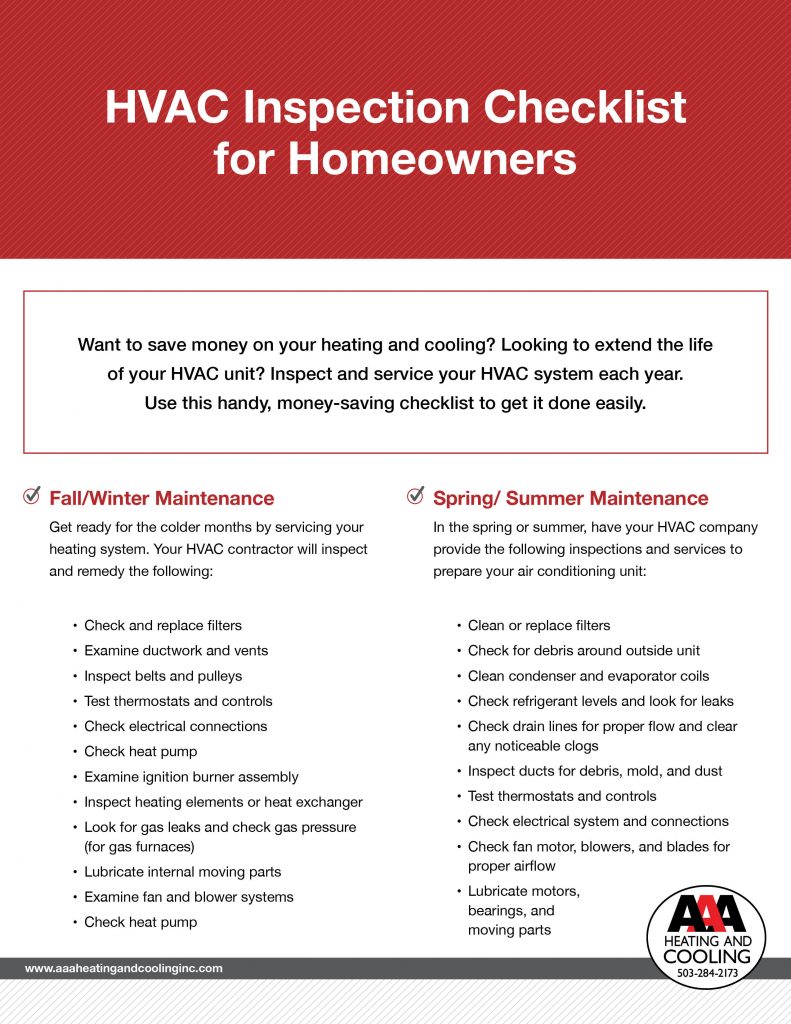
Is Portable or Ventless AC Better for Your Beaverton Home?
 With summer right around the corner, many Pacific Northwest residents are starting to think about how best to stay cool as our days begin to warm up. If you are considering purchasing a portable unit for your home or apartment it’s important to know the options available to you.
With summer right around the corner, many Pacific Northwest residents are starting to think about how best to stay cool as our days begin to warm up. If you are considering purchasing a portable unit for your home or apartment it’s important to know the options available to you.
What AC units are better for your needs? Need to learn the difference between portable AC and ventless air conditioning units? Our Beaverton HVAC contractors provide details and answers below.
Types of Residential Air Conditioning Systems
You may not be aware that there are two types of portable air conditioning options for your home: portable AC and ventless AC. Both have unique cooling options with their own set of pros and cons. To help you make an informed decision on which one is right for you, check out the facts below:
The Difference Between Portable and Ventless Air Conditioners
To ensure you purchase the right air conditioner for your home, it’s first necessary to understand the difference between portable and ventless AC units.
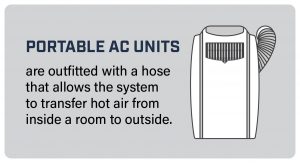 Portable AC units are outfitted with a hose that allows the system to transfer hot air from inside a room to outside. Due to their design, they must be installed next to a window in order for the hose to vent warm air outdoors. Once the exhaust is set up, all you have to do is plug in your portable air conditioning unit and turn it on.
Portable AC units are outfitted with a hose that allows the system to transfer hot air from inside a room to outside. Due to their design, they must be installed next to a window in order for the hose to vent warm air outdoors. Once the exhaust is set up, all you have to do is plug in your portable air conditioning unit and turn it on.
Ventless air conditioners, also known as evaporative air coolers, do not use a hose or vent warm air outside. Instead, these units rely on a tank of water, the process of evaporation, and a fan to circulate the cool air throughout the room.
Choosing Your Air Conditioning Unit
Now that you know the differences between each unit, which is the best solution for you? Let’s examine some pro and cons of each:
1. Portability: While the name, “portable air conditioner,” implies maximum portability, they are actually less moveable than ventless AC systems. Because ventless units don’t come with a hose that requires venting, they can easily be moved from room to room and plugged in. If you are looking to cool down multiple rooms with the ease of one unit, an evaporative air cooler might be right for you.
2. Efficiency: One factor to consider in choosing a portable cooling unit is its energy efficiency. Ventless AC units are more cost-effective upfront, yet they might cost you more in energy costs down the line.
 Portable air conditioners are able to remove warm air from your room and dispel it outdoors, via their venting hose. Ventless units cool the surrounding air, but don’t have the ability to transfer any remaining hot air outside. This can result in you having to run your unit longer to achieve ideal cooling temperatures.
Portable air conditioners are able to remove warm air from your room and dispel it outdoors, via their venting hose. Ventless units cool the surrounding air, but don’t have the ability to transfer any remaining hot air outside. This can result in you having to run your unit longer to achieve ideal cooling temperatures.
3. Cooling Ability: When selecting an air conditioning unit, you want one that cools effectively, while being energy efficient. How effectively an AC unit cools your room can ultimately depend on the humidity levels in your area.
Portable air conditioning units are best for humid climates because they remove moisture from the air and vent it out. Ventless units are ideal for drier climates because they introduce moisture into the air as part of the cooling process.
Here in the Pacific Northwest, we can experience a range of temperatures and humidity levels. That’s why it’s important to work with your HVAC contractor to determine the best air conditioning unit for your home.
Contact Our Beaverton Air Conditioning Installation & Maintenance Professionals
Looking for more guidance on the best air conditioning solution for your needs? AAA Heating and Cooling offers expert advice, installation, and repair for all your HVAC needs. Contact us today to schedule an inspection, or to discuss an upgrade, of your residential AC unit.
Commercial & Residential HVAC Emergency FAQs
Some heating and cooling issues might be able to wait a few days before being inspected. Other HVAC problems require immediate attention. What constitutes an HVAC emergency? When should you contact a local HVAC contractor?
How to Identify an HVAC Emergency
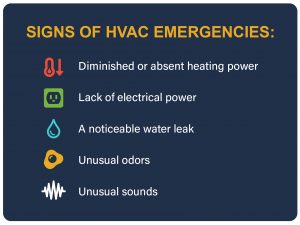 Pressing HVAC troubles can not only be a nuisance, but they can present serious problems to your commercial and residential properties. Luckily an HVAC maintenance pro can help diagnose and remedy the problems. Not sure if you should call in the professionals? Our HVAC contractors share some signs of HVAC emergencies and when to take action.
Pressing HVAC troubles can not only be a nuisance, but they can present serious problems to your commercial and residential properties. Luckily an HVAC maintenance pro can help diagnose and remedy the problems. Not sure if you should call in the professionals? Our HVAC contractors share some signs of HVAC emergencies and when to take action.
Assess the Situation:
HVAC emergencies can present in the following ways:
- Diminished or absent heating power
- Lack of electrical power to your heater or other appliances
- A noticeable water leak
- Unusual odors, like rotten eggs or burning smells
- Unusual sounds coming from furnace or air vents
The first step if any of the above problems present themselves is to stop the damage from getting worse. Shutting down the power and turning off the heater or water main can allow you time to assess the situation.
Call an HVAC contractor if the problem you are experiencing in your residential or commercial property:
- Continues after shutting off power, water, or heat
- Presents any immediate danger (such as smoke or sparks)
- Affects your ability to go about your daily personal or professional activities
5 Common HVAC System Emergencies
1. Clogged Condensate Line
A majority of HVAC service calls are about air conditioning leaks. The most common cause of leaks is due to a clogged condensate line. The condensate line collects excess moisture and moves it outside to prevent damage to your HVAC system. This line can become clogged with dirt, algae, and rust. When this occurs water can’t evacuate the system properly, leading to leaks. While the leaks generally start off small, they can cause serious water damage if not taken care of early on.
To ensure your condensate line is functioning at its most efficient, it’s important to schedule routine maintenance before any major leaks occur.
2. Frozen Outdoor Unit in the Winter
It’s common to have trace amounts of frost on your outdoor unit during the colder, winter months. If your unit is covered in ice for an extended period of time, it can cause long-lasting damage.
When there is ice build-up, either internally or externally, this can be indicative of a poorly functioning defrost cycle on your machine. There are several causes for this, like a bad fan motor or low refrigerant charge. If you notice an iced-over unit it’s best to call your local HVAC contractor.
3. Frozen Coils in the Summer
Frozen coils during the summer occur when the refrigerant temperature is below freezing. This results in the surrounding air to condense and freeze. There are several factors that cause the refrigerant temperature to become so low including:
- Running the A/C when it’s below 60 degrees outside
- Running the A/C too low
To avoid an unexpected HVAC emergency, your residential HVAC installers recommend that homeowners set their A/C at or above 70 degrees. If the issues above aren’t the cause of your frozen A/C unit, then other common factors, like blocked airflow or refrigerant leaks.
4. Blown Fuses and Tripped Breakers
An overworked blower in your HVAC system can cause blown fuses and tripped circuit breakers. If the airflow is blocked due to a dirty air filter this can put stress on your blower. This blockage can cause your blower to overuse energy, which results in tripped breakers.
Schedule an appointment with your HVAC installer to perform a routine air filter checkup. They might recommend replacing the air filter before resetting the circuit breaker.
5. Malfunctioning Furnace
Furnace problems can be the result of a variety of factors. A malfunctioning thermostat, controller issues, cracked heat exchangers, and dirty filters can all cause your furnace to function poorly.
If you notice a scraping sound, or other atypical noises emanating from your furnace, the ball bearings or belts might be failing. A yellow flickering pilot-light could indicate excess carbon monoxide. If you are experiencing any furnace-related issues, we recommend scheduling an appointment with a technician as soon as possible.
To prevent minor problems from turning into major emergencies, have your furnace regularly serviced by an HVAC professional. Scheduling preventive maintenance keeps your furnace running in tip-top shape, saving on costly repairs down the line.
Commercial and Residential Emergency HVAC Repair in Portland and Beaverton
If you think you are experiencing an HVAC emergency, call one of our trusted HVAC professionals. We offer 24-hour emergency service and repair for your urgent situations.
Looking to schedule routine maintenance to keep your system running smoothly? Stop by one of our two locations in Portland or Beaverton to meet with one of our HVAC contractors.
3 Reasons Lights Flicker When Your Home’s AC is On
As a homeowner you may have noticed your lights flicker when you power up your air conditioning unit. What causes your lights to dim? Could it be a problem with the AC unit itself? Is there something wrong with the electricity in your home? Our Beaverton residential heating and air conditioning pros answer these questions and more.
Understanding Your Residential Air Conditioning Unit
Think of electricity in your home the same way you do your residential plumbing. Much like the water in your pipes, there is only so much electricity available in your home at any given time. When you flush your home toilet while running a shower, the water pressure splits between the two fixtures. Electricity behaves in a similar manner.
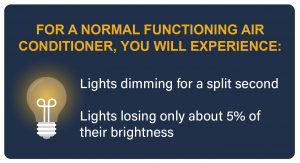 When you turn on a high-energy device, like a modern AC unit, the initial power draw can put a substantial drain on your available electricity. This can cause your lights to dim. While flickering lights might seem worrisome, this is often a normal electrical response to power being diverted.
When you turn on a high-energy device, like a modern AC unit, the initial power draw can put a substantial drain on your available electricity. This can cause your lights to dim. While flickering lights might seem worrisome, this is often a normal electrical response to power being diverted.
How can you tell if the dimming lights are a normal occurrence or signs of a larger problem? For a normal functioning air conditioner, you will experience:
- Lights dimming for a split second
- Lights losing only about 5% of their brightness
Lights that dim for a long time, flicker on and off rapidly, or only dim on particular circuits could be symptomatic of more serious electrical issues. What are the more serious issues and when should you speak with a professional?
1. Damaged or Loose Wires
Do your lights turn off and on quickly when you start up your AC unit? This could be indicative of loose or damaged electrical wires. Faulty wires can cause current loss to your lightbulb. Plus, the voltage drop that occurs when your air conditioner kicks on can exacerbate the problem, making your lights flicker rapidly. Not sure if your wires need repair? Make an appointment with your Beaverton HVAC contractor to check if your wires are discolored, charred, or loose.
2. Weak or Broken Capacitor
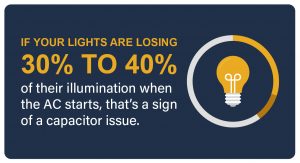 If your lights are losing 30% to 40% percent of their illumination when the AC starts, that’s a sign of a capacitor issue. Your AC capacitor functions like a battery, giving your compression motor the boost of energy it needs to power up. Much like your car battery, your air conditioning compressor can lose its ability to store and maintain power.
If your lights are losing 30% to 40% percent of their illumination when the AC starts, that’s a sign of a capacitor issue. Your AC capacitor functions like a battery, giving your compression motor the boost of energy it needs to power up. Much like your car battery, your air conditioning compressor can lose its ability to store and maintain power.
What does this mean? Your AC is pulling more voltage from other appliances and putting more stress on your compressor to start up. This can cause the lights to temporarily lose their brightness.
3. Overloaded Circuits
Overloaded circuits can present a serious problem. According to the National Electric Safety Code, all major appliances should be on their own dedicated circuit. If you trip your circuit breaker, or hear any buzzing sounds when you turn on your AC unit, you could be overloading your circuits. If you notice any of these signs, unplug any household devices that share the same circuit as your AC unit. This will reduce your risk of fires and electrical shock. For a long term solution, you will need to get a complete assessment and potential repair from your HVAC professionals.
Home HVAC Solutions in Beaverton & Portland
If you aren’t sure what might be causing your flickering lights, call in the experts. AAA Heating and Cooling is your go-to residential HVAC servicing and installation company. We now have two locations, in Portland and Beaverton!
Why Choose a NATE-Certified Oregon HVAC Company?
 Whether you own a home or business in Portland or Beaverton, it’s essential to choose a dependable technician for all your HVAC installation and repair needs. One way to guarantee worry-free results is to work with a NATE-certified HVAC contractor.
Whether you own a home or business in Portland or Beaverton, it’s essential to choose a dependable technician for all your HVAC installation and repair needs. One way to guarantee worry-free results is to work with a NATE-certified HVAC contractor.
North American Technician Excellence (NATE), is an independent organization that certifies technicians in the HVAC industry. NATE-certified technicians undergo an intensive exam, which requires them to demonstrate their working knowledge of commercial and residential HVAC systems.
NATE-certified techs focus their skills in specific areas, including:
- Heat pumps
- Furnaces
- Air conditioning
- Refrigeration
- Indoor air quality
- And more
When you choose an HVAC company with Nate certification, like AAA Heating and Cooling, you can expect professional results and the highest-quality service and equipment.
6 Reasons to Use Our HVAC Services in Beaverton & Portland
Our skilled NATE-certified technicians take the worry out of HVAC installation and repair. Here are some of the benefits you can expect from AAA Heating and Cooling:
1. Lower Utility Bills
 Proper HVAC installation and routine maintenance is key to reducing energy costs. A well-maintained HVAC system lowers overall utility bills. Preventative maintenance starts with scheduling an annual checkup with our technicians.
Proper HVAC installation and routine maintenance is key to reducing energy costs. A well-maintained HVAC system lowers overall utility bills. Preventative maintenance starts with scheduling an annual checkup with our technicians.
2. Increased HVAC System Longevity
Professional upkeep of your residential and commercial HVAC system ensures all mechanisms are functioning properly. This helps avoid costly repairs and extends the life of your unit. Our pros know the ins-and-outs of proper maintenance and can maximize the longevity of your HVAC system.
3. Better Indoor Air Quality
Neglected HVAC units can affect your indoor air quality. Clogged air filters and leaky ductwork are two main factors that can contribute to indoor air pollution. The good news is our local HVAC contractors can help you diagnose and reverse these potential problems. Once the initial problems have been addressed, schedule routine maintenance of your air filter and ducts to prevent air quality issues in the future.
4. Reliable Repairs and Installation
Our NATE-certified HVAC specialists are focused on maintaining the lifespan of your HVAC unit. They perform repairs for long-lasting results—not just a quick fix. This translates to a job done thoroughly the first time around, saving you time and money, and giving you greater peace of mind.
5. Superior Energy Efficiency
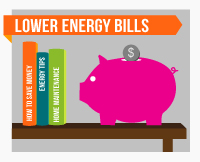 Want to enhance your energy efficiency? We’ll examine every facet of your HVAC unit to optimize performance and increase energy savings. Our HVAC installers can also recommend new, renewable energy options for your home, helping you save money every month on heating and cooling.
Want to enhance your energy efficiency? We’ll examine every facet of your HVAC unit to optimize performance and increase energy savings. Our HVAC installers can also recommend new, renewable energy options for your home, helping you save money every month on heating and cooling.
6. Professional Advice and Knowledge
NATE-certified technicians are experts in their field and have a wealth of knowledge to share. Looking for advice on reducing humidity in your home? Need resources on commercial heat pumps? Our expert HVAC teams in Beaverton and Portland are always available to share their knowledge so you can make informed decisions about your heating and cooling needs.
Visit Our HVAC Company Located in Beaverton & Portland
HVAC systems are intricate machines that require the best technical expertise to keep them at peak performance. At AAA Heating and Cooling, we provide quality repair, expert installation, and professional advice. Want to ensure the health and longevity of your HVAC unit? Let one of our dedicated HVAC professionals assist you. Contact us today!